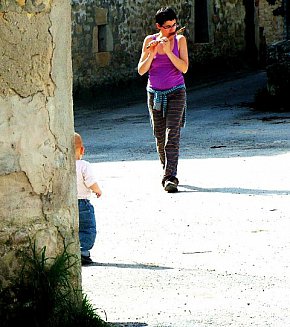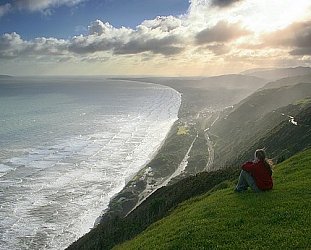Graham Reid | | 4 min read

There is a bit of a chicken and egg conundrum when deciding which of my two loves came first: music or travel.
I was brought up in a musical family, so music has always been an unquestionable part of my life. I was first taken abroad when I was two years old and ever since then I have had a fascination with other cultures and an insatiable appetite to learn more about those who are different to me.
I have carried these two loves with me throughout my life and at some point the two merged, becoming one great mission: to travel the world through music. Although I remain based in various places (currently the UK) for long periods of time unlike other "on-the-road" travellers, I take frequent trips away and always manage to fit in some kind of musical experience - be it a gig, festival, impromptu jam or watching a singer-songwriter playing at the back of a smoky pub.
This method of travelling allows me to learn more about a culture than any other method I’ve tried and you can do it too.
Over the years, I have realised that travelling can take various forms - from the more passive style of travelling, which is often done solely for the sake of ticking places off the bucket list, to the more active forms of travel that involve exploration, getting lost, talking to people, observing and learning. There are a number of ways in which people travel actively, using different techniques to get to know a culture in an “authentic” way.
Much of this necessarily involves talking to locals; this is naturally best done in a relaxed situation such as a local bar in the evenings rather than a busy supermarket. While this is a great method, it comes with its restrictions. For one, it requires speaking the language; it also requires a certain level of confidence and a somewhat outgoing personality. Also, without gender stereotyping too much, as a female it can be considered unusual, and even dangerous at times, to strike up conversation with someone in a bar.
Likewise, for a man (especially if he is talking to a woman) there comes the immediate assumption that he has a hidden agenda of sorts.
In conclusion, there are all sorts of complications aligned with social etiquette and societal boundaries which make striking up random conversation with strangers a bit awkward. As a woman - and a shy, socially awkward one at that - I have had to find a way around this problem if I wanted to satisfy my thirst for cultural understanding.
In my experience, I have found the best way to get around this is to remove the randomness of the conversation by finding some kind of common ground. For me, this has been music; and just like every culture has a language - it also has its music, it is simply a case of finding it. However, this is where obstacle number two can lie.
Suddenly, we are back to square one where we need to talk to locals again to find the best music hangouts. This time though we have an advantage: common ground!
Everyone likes music, they might not like the traditional music of their country, but they will be open to music-related dialogue nevertheless. If the first person you speak to doesn’t know where the best music nights are, then the second or third one will.
A second benefit to this is that you will be surprised at how many invitations you get to music nights. You don’t have to go with the person who asks you if you are afraid of giving the wrong impression. You can go on your own but at least you will know people there if you need them.
If this doesn’t happen, don’t worry, you still have the common ground to work with. Once at the gig, if you are in any way knowledgeable about music, you should be able to come up with some kind of comment or question for either the musicians or the audience members.
For example: what’s that instrument called? Are these a well known group? How long have you been playing together? That was a great show, when are you playing again? Great set! Can I find your music online? And so forth.
As a woman of little words generally, music is one of the subjects I can wax lyrical about. It also removes any awkwardness as I feel that once it becomes evident that I am interested in the music, and not anything else, the person I am conversing with realises I am not simply trying to chat them up (I hope!).
Nevertheless, if talking to strangers is something you are really not comfortable with doing, then don’t fret – music speaks a thousand words! By simply watching a traditional music performance you can learn so much about the culture that bore it - through the lyrics, the instrumentation, the delivery and the audience response you will get a unique insight into the history or "story" of a culture.
Take flamenco music as an example – I once saw a flamenco show in Southern Spain that was performed by a son and his mother, along with 3 female students from their dance school. I learned more about Andalusia's musical heritage and Southern Spanish culture during that 45 minute performance than I did in the two years that I lived there.
The passionate way the mother and son danced together told a story of respect, anger, sadness, pride and warmth.
 I
understood their relationship without them speaking a word. The
respect with which the three female students treated the mother and
the awe in which they watched the son perform his solo pieces spoke
volumes.
I
understood their relationship without them speaking a word. The
respect with which the three female students treated the mother and
the awe in which they watched the son perform his solo pieces spoke
volumes.
The erotic and sexy way the mother performed at the end of the show – in a way that was slightly in jest but done with such confidence and self-assurance - gave flashes of the beauty she must have had in her youth and highlighted the innocence and naivety of her younger students.
I have had many a similar experience through music.
It is my way of understanding people and connecting with them. It is also a vital key to unlocking a culture and is a “way in” for new people in town to meet locals.
Most importantly, music is fun and enjoyable and non-exclusive, so next time you travel try letting the music lead you.
Jessica Kitt is a music and travel writerbased in East Sussex who writes about world music on her blog: http://worldmusictravelblog.tumblr.com/. You can also connect with her on Facebook at: https://www.facebook.com/jessicattiK.
Other Voices Other Rooms is an opportunity for Elsewhere readers to contribute their ideas, passions, interests and opinions about whatever takes their fancy. Elsewhere welcomes travel stories, think pieces, essays about readers' research or hobbies etc etc. Nail it in 1000 words or fewer and contact graham.reid@elsewhere.co.nz.
See here for previous contributors' work. It is wide-ranging.





post a comment